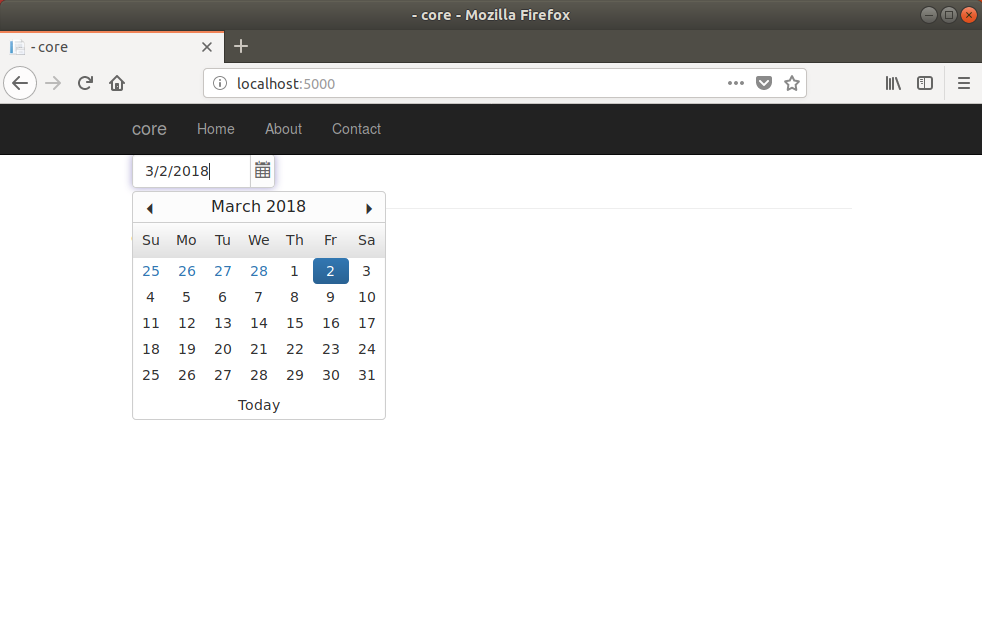How can I help you?
Getting Started on Linux with ASP.NET Core Application
Starting with v16.2.0.x, if you reference Syncfusion assemblies from trial setup or from the NuGet feed, you also have to include a license key in your projects. Please refer to this link to know about registering Syncfusion license key in your ASP.NET Core application to use our components.
The below guidelines demonstrate how to create an ASP.NET Core application and configure with our components.
Prerequisites
Set up the apt-get feeds, then install .NET Core on Ubuntu or Linux Mint. Execute the below commands in terminal window to set up the apt-get feeds for Ubuntu 17.10 and 17.04.
Ubuntu 17.10
Open your terminal window and execute the following commands.
- Register the Microsoft Product key as trusted.
sudo sh -c 'echo "deb [arch=amd64] https://packages.microsoft.com/repos/microsoft-ubuntu-artful-prod artful main" > /etc/apt/sources.list.d/dotnetdev.list'
sudo apt-get update- Setup host Package feed commands.
sudo sh -c 'echo "deb [arch=amd64] https://packages.microsoft.com/repos/microsoft-ubuntu-artful-prod artful main" > /etc/apt/sources.list.d/dotnetdev.list'
sudo apt-get updateUbuntu 17.04
- Setup host Package feed commands
sudo sh -c 'echo "deb [arch=amd64] https://packages.microsoft.com/repos/microsoft-ubuntu-zesty-prod zesty main" > /etc/apt/sources.list.d/dotnetdev.list'
sudo apt-get updateMono Installation
The Mono Project (powered by Xamarin) is a project that tends to make the .NET Framework available to Microsoft’s foreign platforms. To run our ASP.NET Core 2.1.4 web application on Linux, install the Mono by executing the below commands.
- Execute this command to add the Mono’s GPG key to the packages manager.
apt-key adv --keyserver keyserver.ubuntu.com --recv-keys 3FA7E0328081BFF6A14DA29AA6A19B38D3D831EF- Then need to add the required repositories to the configuration file.
echo "deb http://download.mono-project.com/repo/debian wheezy main" | sudo tee /etc/apt/sources.list.d/mono-xamarin.list
echo "deb http://download.mono-project.com/repo/debian wheezy-apache24-compat main" | sudo tee -a /etc/apt/sources.list.d/mono-xamarin.list- Before the Mono installation, execute the below command to download the packages list from the repositories and update the packages with new version.
sudo apt-get update- Finally install the Mono.
sudo apt-get install mono-complete.NET Core SDK installation
Before you start, please ensure any previous .NET Core version installed on your machine. If its exists remove the previous version by using this script.
- Executing the following command automatically install the .NET Core SDK.
sudo apt-get install dotnet-sdk-2.1.4- Execute the following command to prove the SDK installed successfully.
dotnet --versionConfiguration
To configure an ASP.NET Core application and utilize our components, follow the below guidelines.
- Create an ASP.NET Core Project.
- Configuring Syncfusion Components.
Create an ASP.NET Core Application
ASP.NET Core Web application can be created in any one of the following ways.
-
Terminal (Command Line).
-
Yeoman.
Building Projects with Command Line
The following steps helps to create a ASP.NET Core web application using terminal window.
mkdir Sample-
In terminal window, the following steps helps to create a ASP.NET Core web application to configure our components.
-
In the terminal window, we have an options to develop a below listed types of projects. The default type as console application. To know more about the project options and its syntax declarations refer the .NET link.
-
Run the below command to know about project creation templates.
dotnet new --help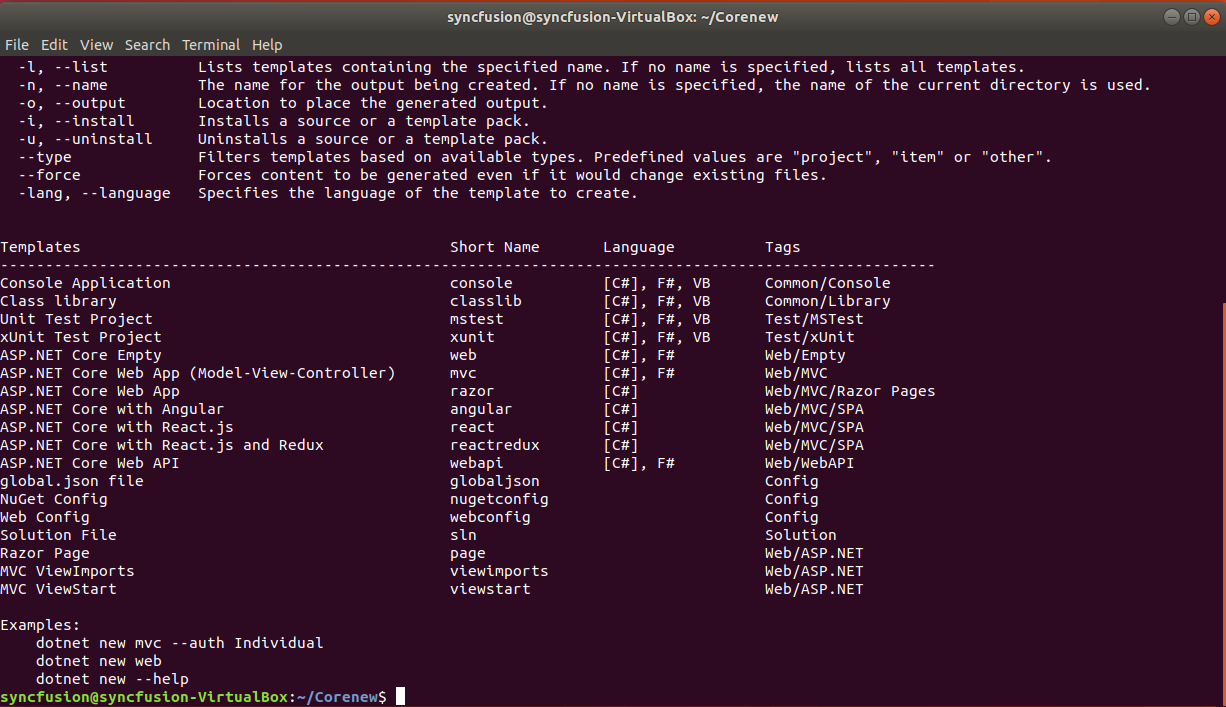
- Then run the below mentioned command to create a new web application. After command execution the project will be created within your folder.
dotnet new mvc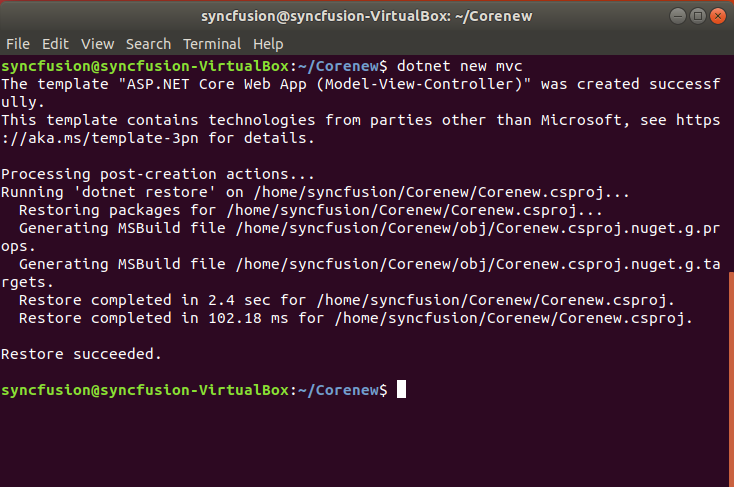
Building Projects with Yeoman
Yeoman is a scaffolding tool for modern web apps and helps us to quick start a new web project. The following steps helps to create an ASP.NET Core 1.0 application using yeoman tool.
Since Visual Studio Code uses folder structure for storing files of application, create a folder of the name ASP.NET.
- Open the Terminal window and execute the below mentioned command to install the Node.js.
curl -sL https://deb.nodesource.com/setup_4.x | sudo -E bash -
sudo apt-get install -y nodejs- Install Yeoman and aspnet generator.
sudo npm install -g yo generator-aspnet- Once Yeoman generator installed successfully, run the below command to invoke a ASP.NET Core project creation wizard.
yo aspnet-
From the list of available projects, select the Web Application Basic [without Membership and Authorization] by using arrow keys.
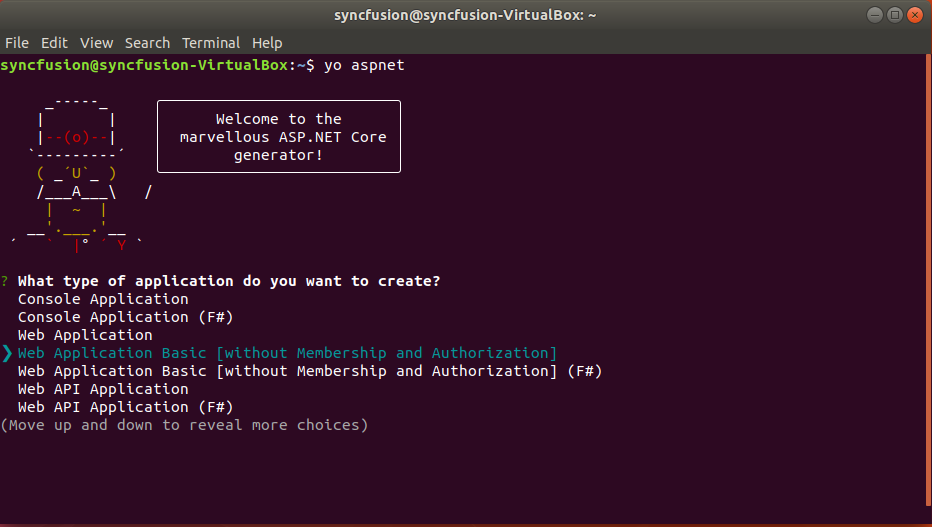
-
And then provide the project name or simply press the ‘Enter’ key to create the project with default name.
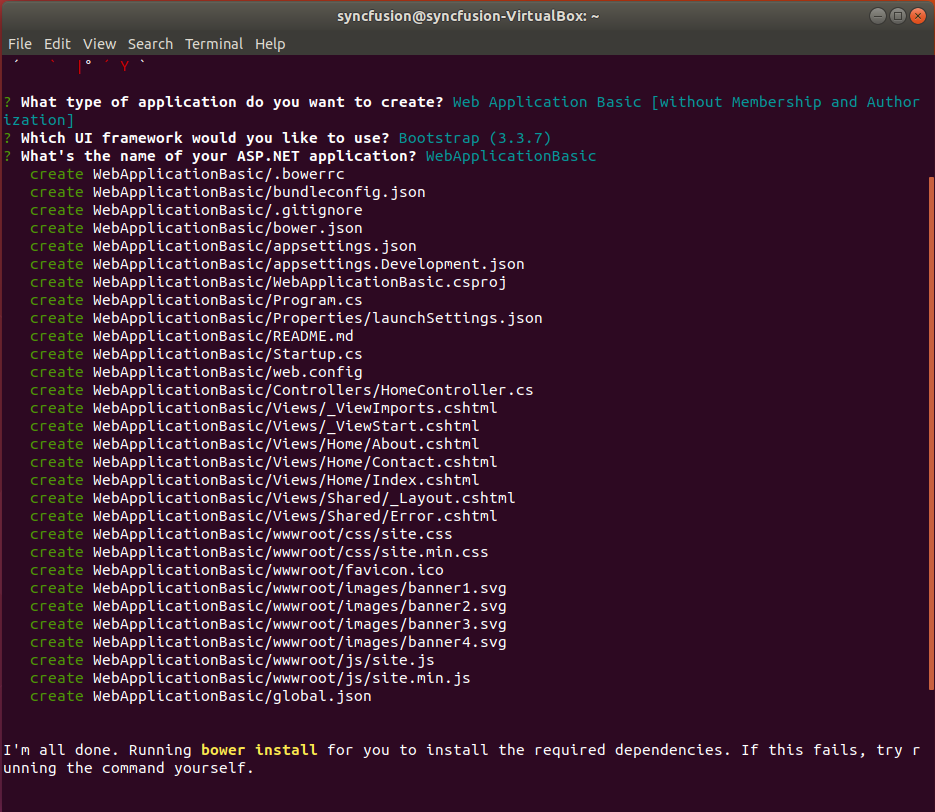
Configuring Syncfusion Components
-
Open Visual Studio Code and open your Sample application folder using Open Folder option. Now your project folder is loaded in Visual Studio Code application.
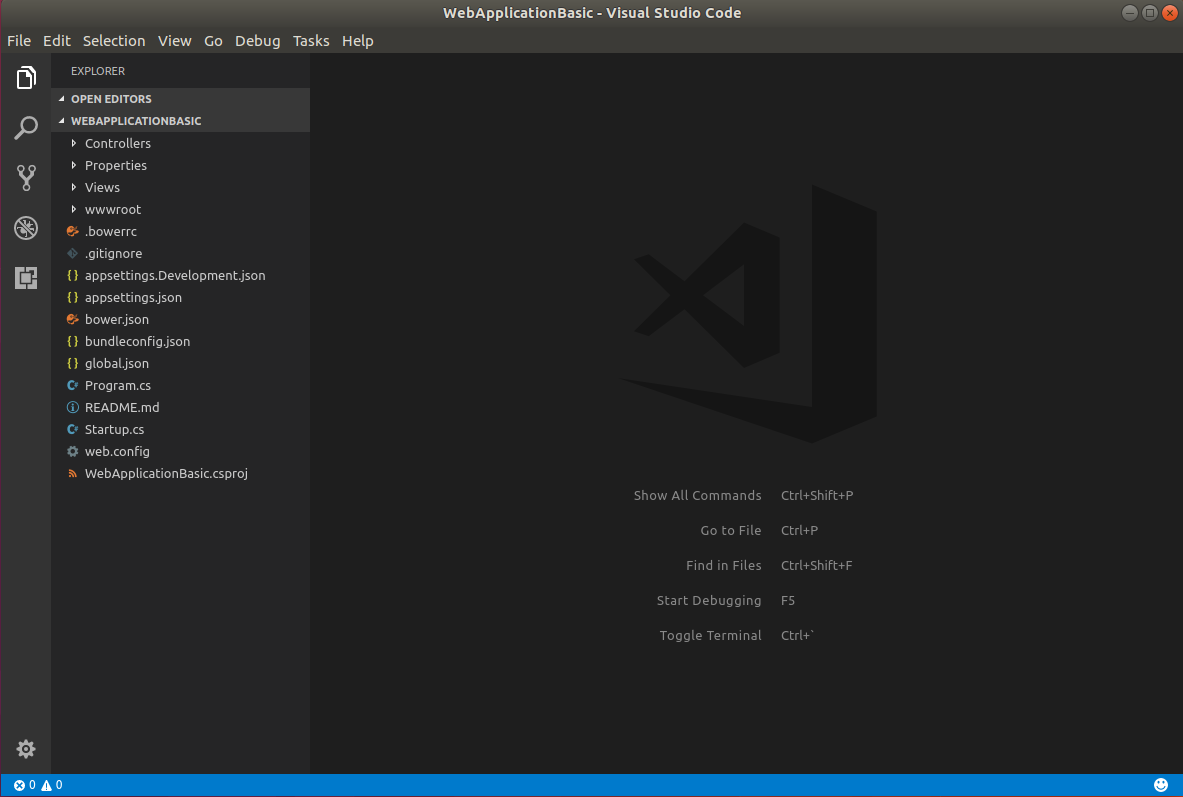
bower.json file has been deprecated from the latest version of DotNetCore 2.1. We have used syncfusion NPM packages and gulp task runner to download the necessary syncfusion scripts and CSS files into wwwroot folder.
- Make sure latest version of npm and Node.js has installed in your machine. To check the npm and node version installed in your machine type the following commands in the terminal window.
node -v
npm -v- Open the global.json file. Remove the content in that file and include the installed dotnet version as depicted in the following code.
{
"sdk": {
"version": "2.1.4"
}
}- Type the following command in the terminal window to create package.json file in your application. package.json will contain the project dependency packages and its version information.
npm init --yes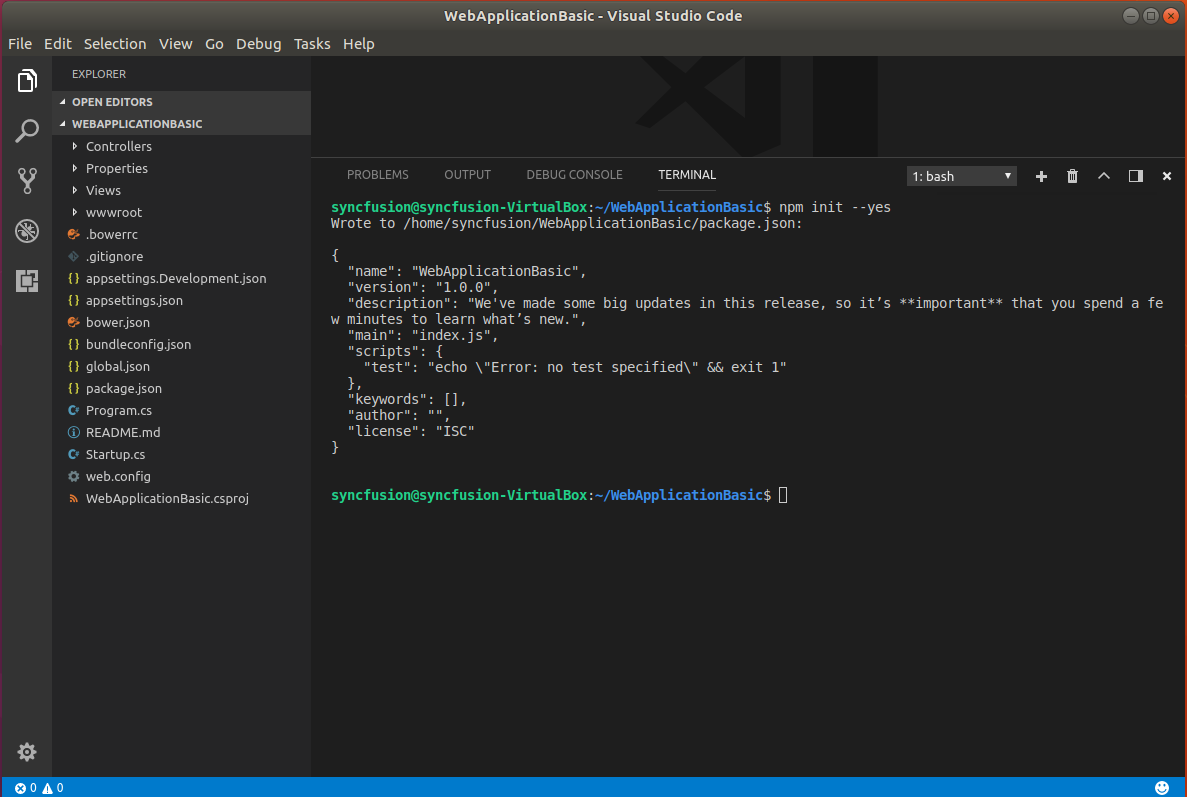
- After package.json file is created. Remove the content in that file and include the following dependencies.
{
"version": "1.0.0",
"name": "asp.net",
"private": true,
"devDependencies": {
"bootstrap": "^3.3.6",
"jquery": "^3.1.1",
"jsrender": "^0.9.75",
"gulp": "^3.9.1",
"syncfusion-javascript": "^16.1.24"
}
}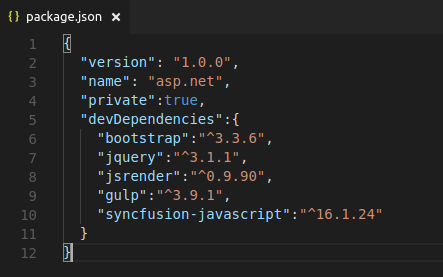
npm installvar gulp = require('gulp');
gulp.task('copy', function () {
gulp.src('./node_modules/syncfusion-javascript/**')
.pipe(gulp.dest('./wwwroot/lib/syncfusion-javascript'));
});- To copy any other project dependency packages into the wwwroot folder, write a new task for each packages as given in the following code sample.
gulp.task('bootstrap', function () {
gulp.src('./node_modules/bootstrap/**')
.pipe(gulp.dest('./wwwroot/lib/bootstrap'));
});
gulp.task('jquery', function () {
gulp.src('./node_modules/jquery/**')
.pipe(gulp.dest('./wwwroot/lib/jquery'));
});
gulp.task('jquery-validation', function () {
gulp.src('./node_modules/jquery-validation/**')
.pipe(gulp.dest('./wwwroot/lib/jquery-validation'));
});
gulp.task('jsrender', function () {
gulp.src('./node_modules/jsrender/**')
.pipe(gulp.dest('./wwwroot/lib/jsrender'));
});To configure Visual Studio Code to use Gulp as task runner, Press Ctrl+Shift+P to bring up the command palette. Now type Configure Task and select Create task.json file from template.
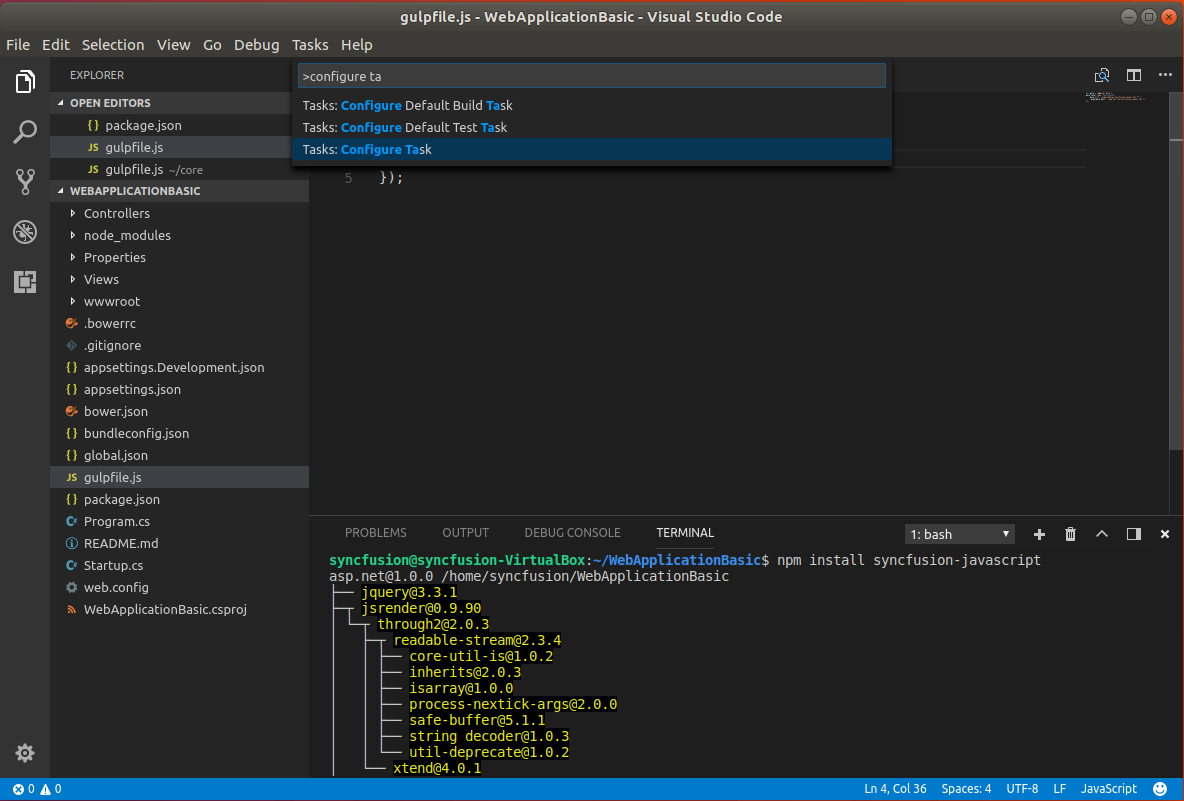
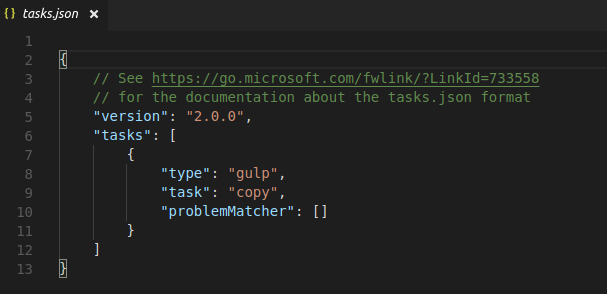
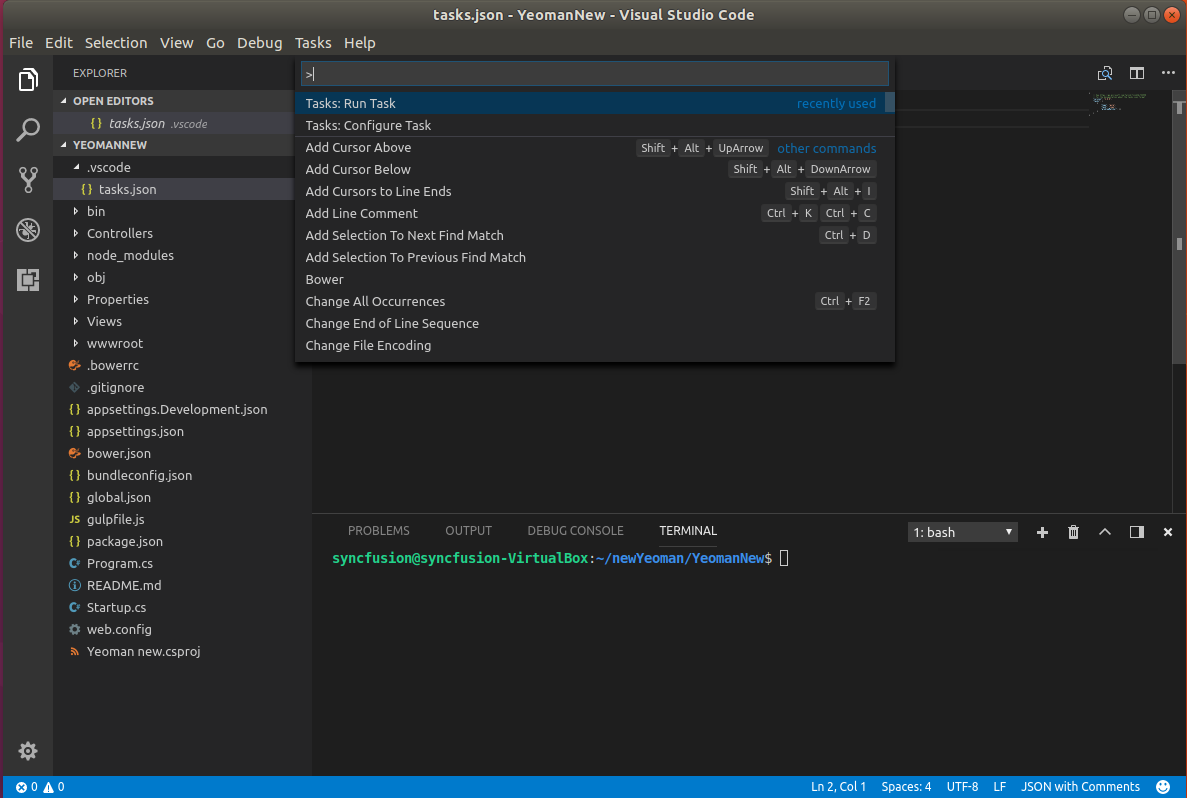
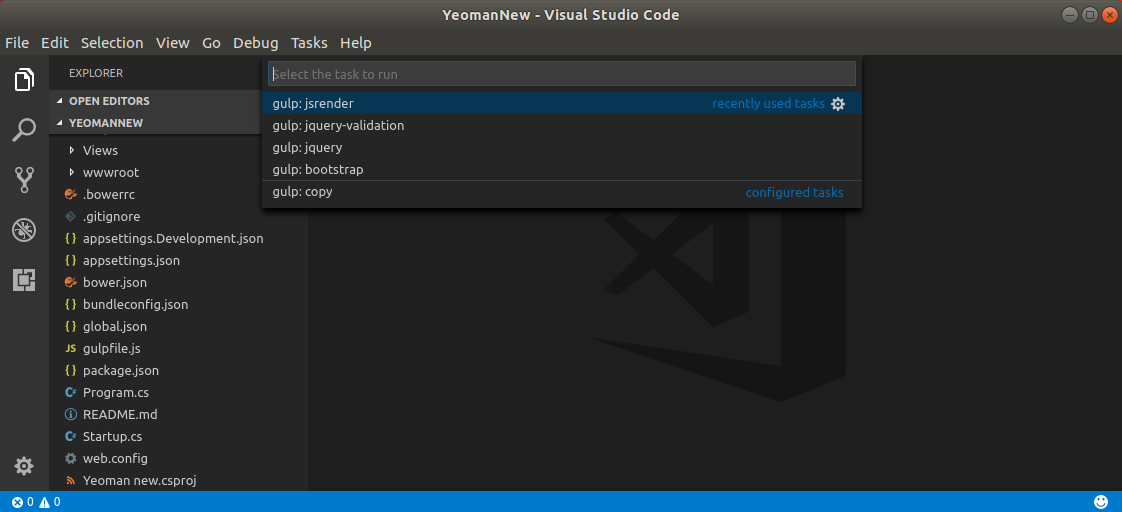
-
Now refer our Syncfusion package Syncfusion.EJ.AspNet.Core into your application for our components deployment. The packages configuration & installation guidelines will be documented here.
-
Once the NuGet packages installation gets completed, the Syncfusion.EJ.AspNet.Core package reference was automatically added in .csproj file.
<PackageReference Include="Syncfusion.EJ.AspNet.Core" Version="16.1600.0.24">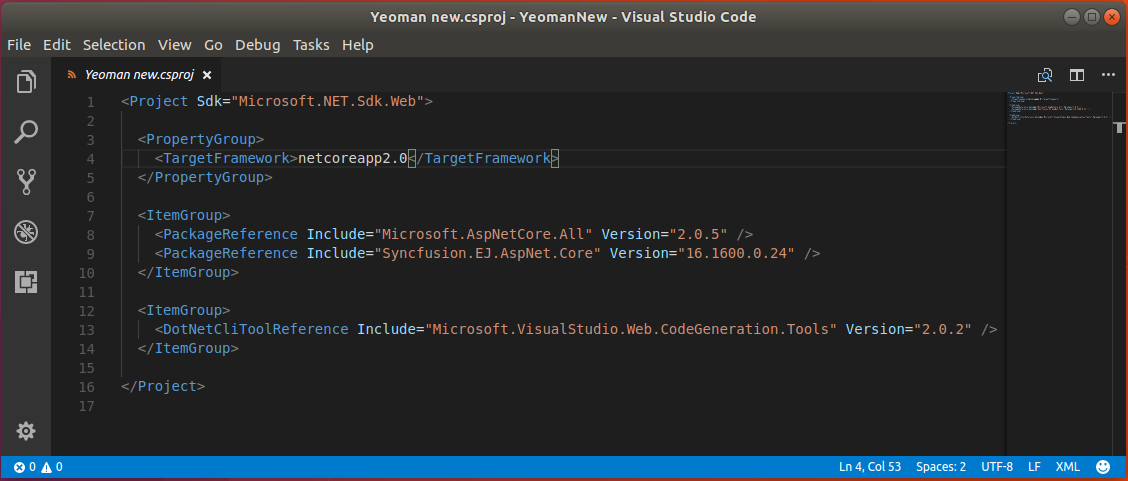
The ASP.NET Core NuGet packages versioning has been streamlined as 16.1.0.32 in shorter than older versioning (16.1600.0.32) from Volume 1, 2018 service pack 1 release (16.1.0.32). Since all the framework version wise assemblies are grouped into a single package.
The package “Syncfusion.EJ.MVC” renamed into “Syncfusion.EJ.AspNet.Core” from Volume 3, 2016 (14.3.0.49) release. The “preview2-final” keyword removed our Syncfusion packages naming from Volume 1, 2017 (15.1.0.33) release.
- Open _viewimports.cshtml file from the views folder and add the following namespace for components references and Tag Helper support.
@using Syncfusion.JavaScript
@addTagHelper *, Syncfusion.EJ- Open Terminal window and navigate to your project folder then execute the following command to restore the packages which are all specified in your .csproj file.
dotnet restore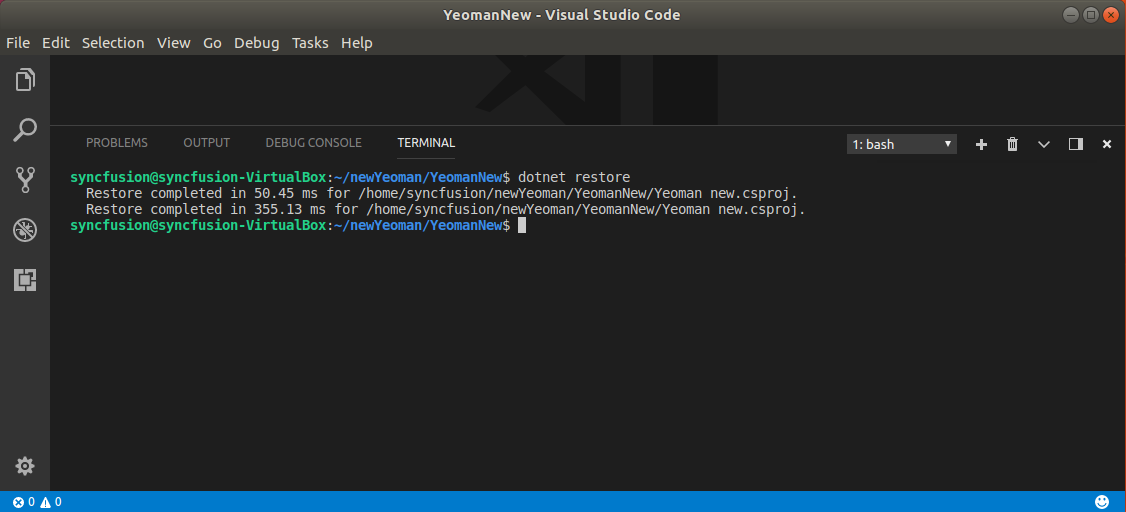
- Now refer the necessary scripts and CSS files in your _layout.cshtml page.
NOTE
Include the below mentioned scripts and CSS references under the appropriate environment. (For eg: If your environment is “Development”, then refer the scripts and CSS files under the tag environment names=”Development”). Refer all the required external and internal scripts only once in the page with proper order. Refer this link to know about order of script reference.
<html>
<head>
<link rel="stylesheet" href="~/lib/bootstrap/dist/css/bootstrap.css" />
<link href="~/lib/syncfusion-javascript/Content/ej/web/bootstrap-theme/ej.web.all.min.css" rel="stylesheet" />
<link href="~/lib/syncfusion-javascript/Content/ej/web/responsive-css/ej.responsive.css" rel="stylesheet" />
<script src="~/lib/jquery/dist/jquery.js"></script>
<script src="~/lib/jsrender/jsrender.min.js"></script>
<script src="~/lib/syncfusion-javascript/Scripts/ej/web/ej.web.all.min.js"></script>
</head>
<body>
</body>
</html>NOTE
jQuery.easing external dependency has been removed from version 14.3.0.49 onwards. Kindly include this jQuery.easing dependency for versions lesser than 14.3.0.49 in order to support animation effects.
- Add ScriptManager to the bottom of the layout.cshtml page. The ScriptManager used to place our control initialization script in the page.
<ej-script-manager></ej-script-manager>- Now open your view page to render our Syncfusion components in Tag Helper syntax.
<ej-date-picker id="datepicker" value="@DateTime.Now"></ej-date-picker>-
Finally execute the dotnet run command to run your sample browser.
-
Then open your browser and paste the listening port localhost:5000 to view your sample in browser.
